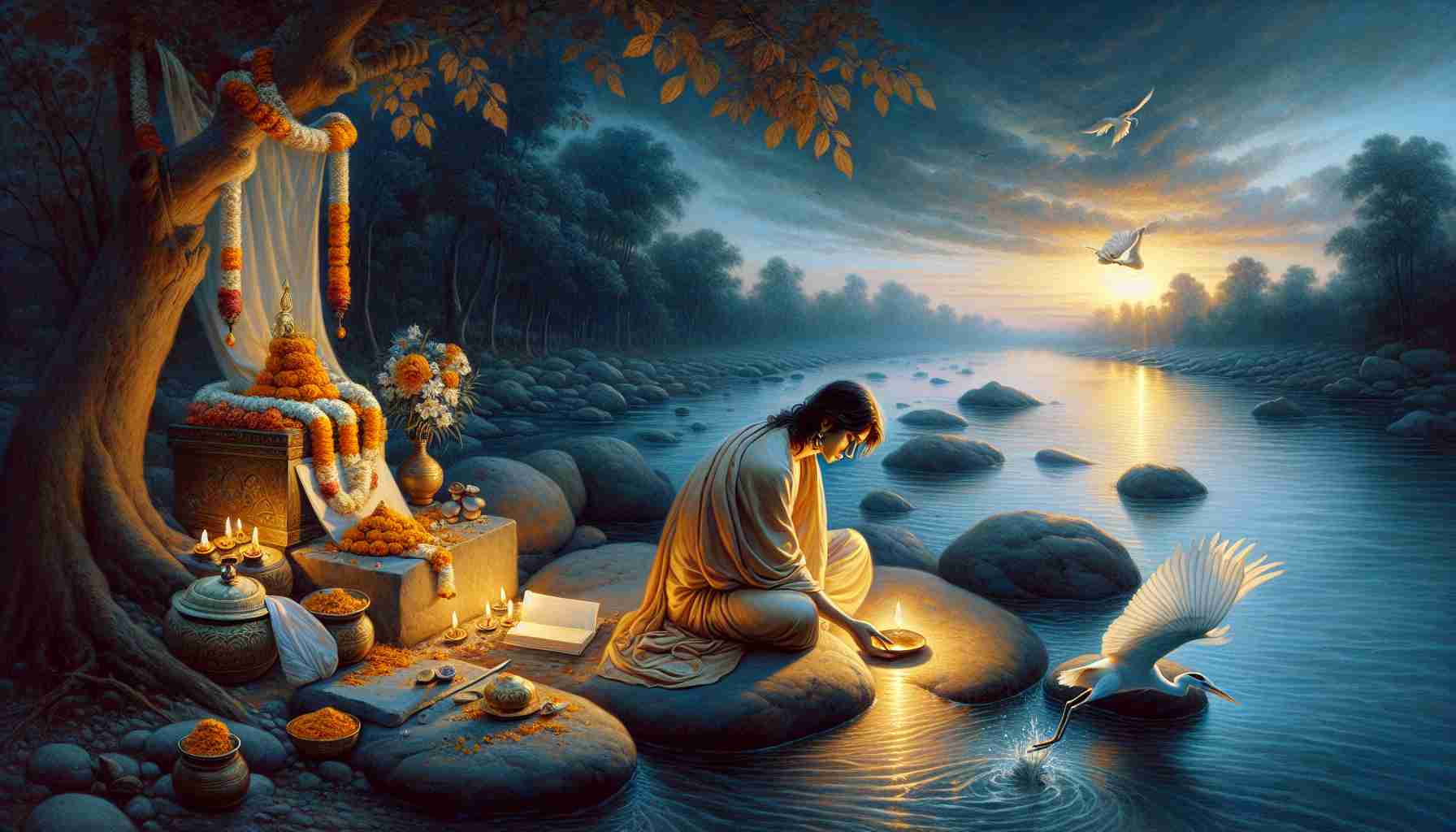

I still remember the weight of the thali — the brass plate I carried to the riverbank, filled with diya lamps, marigolds, and the few sweets Ma had prepared the day before her passing. My hands trembled, not from their weight, but from the silence she left behind.
My name is Arjun. I come from a quiet village near the Godavari River. When Ma left her body last spring, something inside me shattered I didn’t know could break. She had always been there — warm chapatis on cold mornings, soft corrections when I got too proud, her lips forever whispering “Krishna, Krishna,” like breath itself.
At first, even the Ganga-like flow of scripture felt dry. People spoke kind words. They tried. “Her soul is with Bhagavan,” they said gently — Bhagavan, the Supreme Being, the source of all. But none of it reached the hollow place in my chest.
For thirteen days, I performed the rites. I recited from the Garuda Purana, which speaks about the soul’s journey after death. But I did it by rote, not belief. Each mantra felt like smoke — rising, vanishing, unanswered.
On the fourteenth day, I walked to the river alone to let the last diya float away — a symbol of release. The water shimmered orange in the fading sun, and I sat for a long time on the stones. Something about watching the little flame bob and dance made me weep in a way I hadn’t yet allowed.
And then my mind pulled an old phrase from the Bhagavad Gita — something Ma used to say when she’d set oil lamps on the windowsill each dusk: “na jāyate mriyate vā kadācin” — “The soul is never born and never dies.” (Gita 2.20).
I whispered it aloud. Not like a scholar. Not like a mourner. Just… like a son trying to remember what his mother taught him.
“Soul is never born… and never dies.”
The wind shifted. A white heron took flight from the far embankment, its wings wide over the river. I wasn’t expecting anything, but at that moment, I felt Ma — not as a ghost or vision, but as presence. Not lost. Just unseen.
I remembered a verse from the Chandogya Upanishad, one Ma had taught me when I was small: “Tat tvam asi” — “That thou art.” That the same essence in the stars, the river, and the breath in our chest — is one.
I stood slowly. I didn’t feel healed, but I did feel held.
That night, I folded her old sari and placed it near the altar. I offered quiet pranams — respectful bows — and told her what I never had the courage to when she was alive: “I will meet you again, Ma. I don’t know when. But I know this path — of the soul — is eternal.”
She had known it all along.
And at last, I was beginning to remember.
I still remember the weight of the thali — the brass plate I carried to the riverbank, filled with diya lamps, marigolds, and the few sweets Ma had prepared the day before her passing. My hands trembled, not from their weight, but from the silence she left behind.
My name is Arjun. I come from a quiet village near the Godavari River. When Ma left her body last spring, something inside me shattered I didn’t know could break. She had always been there — warm chapatis on cold mornings, soft corrections when I got too proud, her lips forever whispering “Krishna, Krishna,” like breath itself.
At first, even the Ganga-like flow of scripture felt dry. People spoke kind words. They tried. “Her soul is with Bhagavan,” they said gently — Bhagavan, the Supreme Being, the source of all. But none of it reached the hollow place in my chest.
For thirteen days, I performed the rites. I recited from the Garuda Purana, which speaks about the soul’s journey after death. But I did it by rote, not belief. Each mantra felt like smoke — rising, vanishing, unanswered.
On the fourteenth day, I walked to the river alone to let the last diya float away — a symbol of release. The water shimmered orange in the fading sun, and I sat for a long time on the stones. Something about watching the little flame bob and dance made me weep in a way I hadn’t yet allowed.
And then my mind pulled an old phrase from the Bhagavad Gita — something Ma used to say when she’d set oil lamps on the windowsill each dusk: “na jāyate mriyate vā kadācin” — “The soul is never born and never dies.” (Gita 2.20).
I whispered it aloud. Not like a scholar. Not like a mourner. Just… like a son trying to remember what his mother taught him.
“Soul is never born… and never dies.”
The wind shifted. A white heron took flight from the far embankment, its wings wide over the river. I wasn’t expecting anything, but at that moment, I felt Ma — not as a ghost or vision, but as presence. Not lost. Just unseen.
I remembered a verse from the Chandogya Upanishad, one Ma had taught me when I was small: “Tat tvam asi” — “That thou art.” That the same essence in the stars, the river, and the breath in our chest — is one.
I stood slowly. I didn’t feel healed, but I did feel held.
That night, I folded her old sari and placed it near the altar. I offered quiet pranams — respectful bows — and told her what I never had the courage to when she was alive: “I will meet you again, Ma. I don’t know when. But I know this path — of the soul — is eternal.”
She had known it all along.
And at last, I was beginning to remember.